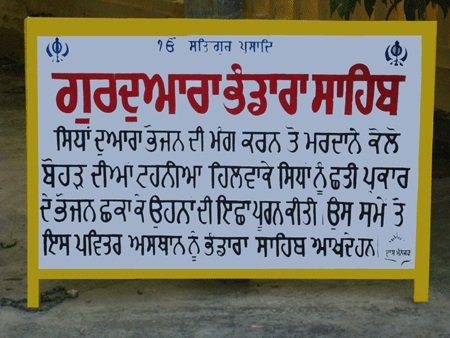BHANDARA from bhandar (Skt. bhandara = bhanda, vessel, implement, + agara, house, meaning storehouse, depository, treasure house) has been used in this literal sense in Guru Granth Sahib, the Holy Book of the Sikhs. In extended connotation the term stands for a feast given especially for yogis and sannyasins, or to invoke divine favour for a private or public cause. Bhandara in current usage means any feast under religious auspices by individuals or institutions open to laymen as well as to devotees. In this sense it would be like guru ka langar, a typically Sikh institution, except that the latter is not aimed at any specific object, nor is it restricted in duration.
As an adjunct of the gurdwara the langar is always open for pilgrims, wayfarers and the needy. Periodically on festive occasions sadhus ofUdasi, Nirmala and other denominations hold their ritual bhandaras at famous places of pilgrimage with great fanfare. Bhandaras fall into two varieties pakka and kachcha. The former comprises rich viands with most of the eatables fried in ghee while the latter offers a simpler fare, closer to the workaday repast.
M.G.S.
In Sikhism, Bhandara refers to the practice of serving free meals to all, regardless of religion, caste, or social status. This tradition is closely tied to the concept of Langar, which is the community kitchen established by Guru Nanak, the founder of Sikhism. Here are some key aspects of Bhandara in Sikhism:
- Equality and Inclusivity: Bhandara embodies the Sikh principle of equality. Everyone sits together in rows, regardless of their background, to share the same meal, symbolizing unity and humility.
- Seva (Selfless Service): Preparing and serving food during Bhandara is considered an act of seva, or selfless service. Volunteers from the community come together to cook, serve, and clean, fostering a spirit of cooperation and generosity.
- Spiritual Offering: The food served in Bhandara is seen as a divine blessing, and the act of feeding others is considered a way to honor God and express gratitude.
- Global Impact: Sikh communities worldwide organize Bhandaras during festivals, special occasions, and times of need, such as natural disasters or humanitarian crises. This practice has earned admiration for its commitment to serving humanity.







